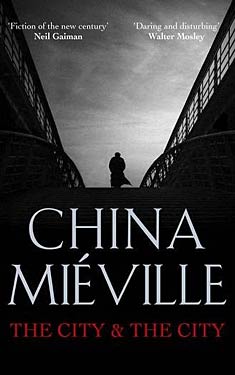China Miéville
Completed 4/19/2013, reviewed 4/19/2013
3 stars
The City and the City is about a pair of amazingly
constructed cities. While they are two
separate cities, both of them occupy some of the same physical space. In some places, there are parts of one city
totally existing in the other. The
citizens of the two cities must “unsee” the other city. This separation is kept in place by Breach, an
organization which makes sure the two cities are kept mentally separate by their
citizens. In addition, there are strict
rules about crossing the borders of the two cities, even though separation is
not purely physical.
 The plot surrounds the murder of a woman and may involve a
breach. The investigation of the murder
brings in the theory that there may be a third city, which is hiding in between
the two cities, i.e., it appears to one city’s citizens as part of the other
city, and vice versa. Thus it exists in
plain sight, but the citizens of each city ignore it thinking it is part of the
other city.
The plot surrounds the murder of a woman and may involve a
breach. The investigation of the murder
brings in the theory that there may be a third city, which is hiding in between
the two cities, i.e., it appears to one city’s citizens as part of the other
city, and vice versa. Thus it exists in
plain sight, but the citizens of each city ignore it thinking it is part of the
other city.
This premise is awesome.
I began the book, voraciously waiting for the descriptions of the
cities’ separation and its social implications.
I was even more drawn in by the “secret city.” I was most excited when the details of the
conspiracy of keeping the third city secret were revealed, and when they
related to the unfolding of the plot.
Unfortunately, I found the plot eventually
unsatisfying. It turned out to be just
another detective potboiler. The great
revelations about all three cities took place in the course of the book. Somehow, I was hoping that there would be
something more earthshattering about three cities in the solving of the
murder. But there wasn’t.
I also found the dialogue very often to be choppy. Maybe I just don’t read enough noir. I felt that dialogues were hard to
follow. I was happiest reading the
descriptions and long revelatory dialogues about the cities.
SPOILER ALERT 1: I also didn’t like the last minute pulling
in of the corporations as part of the conspiracy. They were not part of the story. They felt introduced merely to throw you off
before the big reveal of the actual murder.
It almost felt like a mechanism for making the story longer.
SPOILER ALERT 2: I
had a hard time with the ending. It’s
revealed that the only thing that keeps the two cities separate is the belief
by their citizens that they personally must keep them separate. The organization known as Breach can only
exist because the citizens need them to exist to keep up the charade of
separation. However, the story is told
in first person by the main character.
In the end, he becomes part of Breach.
So in his telling of the story, he creates his own breach by revealing
the fallacy of the realness of the separation.
The existence of the story by Breach is a breach. It brings to the citizens’ consciousness that
there is no real separation, beginning the destruction of the separation. This is a contradiction. Breach should censor the breach and not allow
us to read the book.
I gave the book three stars for the inventiveness of the
universe created and for the advancement of the plot through the first 2/3s of
the book.
No comments:
Post a Comment